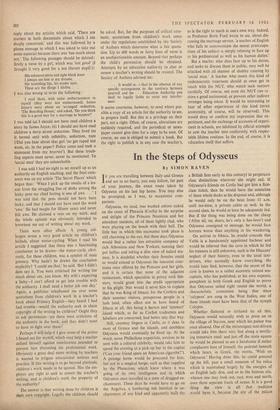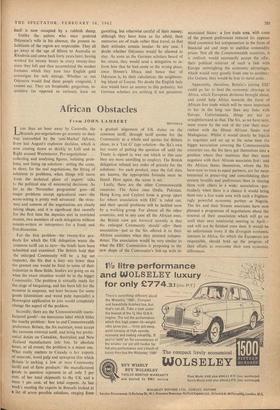In the Steps of Odysseus
By SIMON RAVEN
F you are travelling between Italy and Greece 1 and are in no hurry, you may follow, for part of your journey, the exact route taken by Odysseus on his last lap home. You may also be prompted, as I was, to occasional com- parison.
Odysseus, we read, was washed ashore naked on the coast of Phceacia (Corfu) to the surprise and delight of the Princess Nausicaa and her attendant maidens, all of them lightly clad, who were playing on the beach with their ball. The little bay in which this encounter took place is still charming to the eye, but these days Odysseus would find a rather less attractive company of rich Athenians and New Yorkers, sunning their pot bellies and taking a dim view of naked sea- men. It is doubtful whether their females could or would extend to Odysseus the innocent cour- tesies once offered by the Princess and her girls, and it is certain that none of the adjacent restaurants, which specialise in pricey rock lob- sters, would grant him the credit appropriate to his plight. Nor would it serve him to explain that he was King of Ithaca; for the Corfiots and their summer visitors, prosperous people in a lush land, often affect not to have heard of Ithaca at all, this being a barren and 'unsmart' island which, as far as Corfiot tradesmen and hoteliers are concerned, had better stay that way.
Still, courtesy lingers in Corfu, as it does in most of Greece and the islands, and doubtless Odysseus would eventually be fixed up. At the worst, some Philhellene expatriate, anxious to be seen with a cultural celebrity, would take him to spend the evening at a pick-up bar in the capital (Van your friend spare an American cigarette?'). A passage home would be procured for him; but not in a magical barge, such as that supplied by the Phteacians, which knew where it was going of its own intelligence and in which Odysseus once travelled in a state of drugged en- chantment. These days he would have to go on the Angelica, a lumbering tub inimical to en- chantment of any kind and apparently built (by a British firm early in this century) to perpetuate class distinctions wherever she might sail. If Odysseus's friends on Corfu had got him a first- class ticket, then he would have the amenities of three whole decks at his disposal and, although he would only be on the boat from 11 a.m. until tea-time, a private cabin as well. In the second class, he would at least be adequately fed. But if the thing was being done on the cheap ('After all, my dears, he's only a has-been') and Odysseus consigned to steerage, he would face horrors worse than anything in his wandering.
On arrival in Ithaca, he would concede that Vathi is a handsomely appointed harbour and would be relieved that the cave in which he hid his treasure is still unknown, such is the Ithacans' neglect of their history, even to the local taxi- drivers, who normally know everything. He would later find, however, that the secret of his cave is known to a rather eccentric retired sea- captain, who has published, at his own expense, pamphlets in both Greek and English to prove that Odysseus sailed right round the world; a characteristic contention being that since 'calypsos' are sung in the West Indies, one of these islands must have been that of the nymph Calypso.
Whether flattered or irritated by all this, Odysseus would naturally wish to press on to the village of Stavros, near which his palace was once situated. One of the intransigent taxi-drivers would take him there very fast along a terrify- ing mountain road; and just off the main square he would be pleased to see a handsome if rather complacent bust of himself, the pedestal beneath which bears, in Greek, the motto, 'Wish on Odysseus.' Having done this, he could proceed up the hill, past a small museum of his relics which is maintained largely by the energies of an English lady don, and so to the famous site, whence one may look out, east, west and north, over three separate tracts of ocean. It is a good thing the view is all that tradition would have it, because the site of the palace itself is now occupied by a rubbish dump.
Unlike the suitors who once pestered Odysseus's wife in his absence, the present in- habitants of the region are respectable. They all go away at the age of fifteen to Australia or Rhodesia and come back forty years later, having worked for twenty hours in every twenty-four since they left and thus accumulated the modest fortunes which they turn into English gold sovereigns for safe storage. Whether or not Odysseus would find these people congenial, I cannot say. They are hospitable, gregarious, in- quisitive (as opposed to curious), keen on gambling, but otherwise careful of their money; although they have been so far afield, their memories are of trade rather than travel, so that their attitudes remain insular. In any case, I doubt whether Odysseus would be allowed to stay. As soon as the German scholars heard of his return, they would send a delegation to in- form him that he had come to the wrong place, since Homer's Ithaca and hence that of Odysseus is, by their calculation, the neighbour- ing island of Leucas. No doubt the English lady don would have an answer to this pedantry, but German scholars are nothing if not persistent.


































 Previous page
Previous page